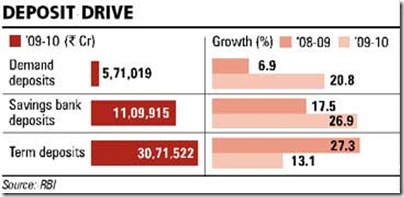Despite fraught with multiple corruption charges within the political party, one thing for sure – the reformist movement at the UPA government has reigned over the lethargically-motivated bureaucratic red-tapism.
This Congress-led government has certainly stepped on the gas for finance sector reforms. And, whenever such reforms are formulated in association with the country’s apex banker, the Reserve Bank of India (RBI), there is all the more reason for the finance world to cheer around the new development.
Moreover, a positive development in policy or operational parameters in the space of Saving Bank account, which are meant to promote the habit of saving among the people and facilitates safekeeping of money, promotes stability and additional value for the investor’s hard earned money.
Currently, interest rates on savings banks accounts are calculated at the rate prescribed by the RBI from time to time. Present rate on saving deposits at 3.5% per annum are calculated on daily basis from April 1, 2010.
As a part of financial sector reforms until now, RBI has deregulated interest rates on deposits, other than saving bank deposits which have remained untouched since March 1, 2003. Keeping in view progressive deregulation of interest rates, RBI has released a Discussion Paper aimed at inviting public comments on their views for deregulation of savings bank rate.
This, in fact, may turn out to be blessing in disguise against the backdrop of soaring inflation, high commodity prices and fast depleting value of money. Not only will deregulation improve swift monetary policy transmission, but also pave way for innovative products for the depositors.
What’s more? The new regime is also likely to promote healthy competition among bankers to mobilize incremental low-cost deposits and an increase of 50-100 bps in interest rates, depending on rate flexibility backed by subtle market forces.
Just imagine… now we at least stand a chance of benefiting from a much higher 4.5% saving rates, sometime in future. What say?

